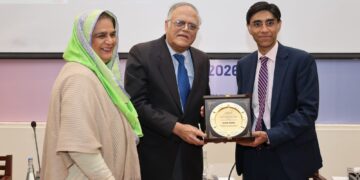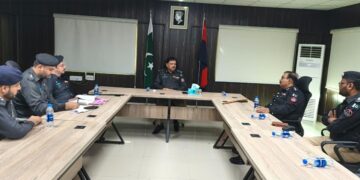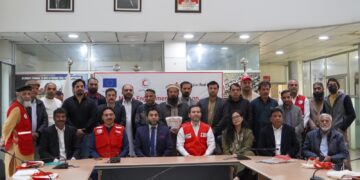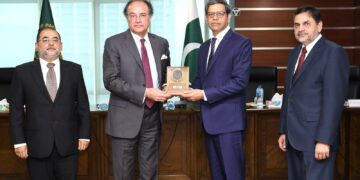SKARDU- While welcoming multiple initiatives of TVET SSP and international donors for producing skilled manpower in the region, Gilgit-Baltistan Assembly Speaker Syed Amjad Zaidi has said that the region can grab substantial benefits of CPEC projects by providing a skilled workforce that can bring economic and social development of the local people.
He expressed these remarks while addressing a donors conference organized by Directorate of Technical Education and Skills Development (DTESD), GB, in collaboration with TVET Sector Support Programme (TVET SSP) here on Monday.
Purpose of the event was to ensure sustainability as well as promotion of TVET programmes in the region through enhanced collaboration of donors.
Education Minister GB Raja Azam Khan, Secretary Education Iqbal Hussain Khan, Head of Cooperation of EU Delegation in Pakistan Mr. Ovidiu Mic, Head of TVET SSP Ms. Iris Cordelia Rotzoll, Director TESD Faizullah Lone along with representatives from donors’ organizations attended the conference.
The GB assembly speaker mentioned that in the CPEC scenario, the region is witnessing a number of mega economic interventions especially construction of dams and roads network, unexplored mineral resources, tourism, trade, renewable energy and emerging IT sector which is a huge job market and “We can get major benefits of this market by producing a skilled force.”
“To cater to this situation, it requires complementarities such as an effective TVET system that can adapt and produce the required trained workforce in GB, so that upcoming positions can be filled by a Pakistani work force,” he maintained.
Syed Amjad Zaidi also said that the partnership between DTESD, TVET SSP and other development partners will help train the required workforce to meet the challenges for prosperity and economic growth in GB.
Addressing the audience, Mr. Ovidiu Mic said that the collaborative efforts of various development partners in this region can further build on what EU and its development partners have initiated with our engagement over the past decade. This region has a lot of scope for a variety of skills in sectors such as construction, engineering, hospitality, information technology, and renewable energy, and “We look forward to continuing our engagement in the TVET sector here.”
The TVET SSP, which is funded by European Union, Germany and the Royal Norwegian Embassy, is implemented by the National Vocational and Technical Training Commission (NVTTC) and the Deutsche Gesellschaft für Internationale Zusammenarbeit (GIZ), in collaboration with regional TEVTAs, PVTC and regional TVET bodies like GB DTESD.
The GB government is taking concrete steps for the promotion of TVET sector through the approval of the TVET Act 2018 of Gilgit Baltistan. The legislative process has opened doors for real-time reforms in the TVET Sector of this remote region.
Some key initiatives of TVET SSP in Gilgit-Baltistan include human resource development and private sector engagement in TVET.
Through this conference, the GB government provided a platform to present a roadmap for sustainability of interventions of TVET SSP carried out since 2011 in the region. It will also encourage the TVET sector to attract donors and partners for the funding of key areas of the 5-year TVET Policy Implementation Plan and Gilgit Baltistan TVET Strategy (2021-30).
Later, a ‘Rozgar Mela’ on the government vocational training sector where as many as 80 RPL and CBT graduates tried their skills for multiple job opportunities. These graduates also received their graduation certificates.
On the sidelines of this conference, a workshop has also been organized on October 26, 2021 that would provide a platform to putting forth the measures for sustainability of the achievements under TVET SSP and beyond.



















